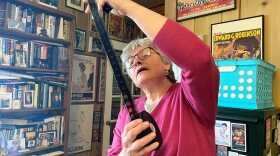Yellow Rose, an award-winning American-Filipino film by Home Away Pictures and Civilian Studios, captures the spirit of the mid-Twentieth Century American independent film movement. In this 2020 release, director and co-writer Diane Paragas gives viewers an in-depth look at the plight of a Filipino mother and her seventeen-year-old daughter, undocumented or illegal aliens living quietly and respectfully in a Texas town near Austin.
Tony-nominated Broadway actress Eva Noblezada stars as young Rose Garcia, a hard-working high school student and talented singer/songwriter, whose world caves in when her mother, Priscilla, played by Princess Punzalan, is arrested by Immigration and Customs Enforcement (ICE).
In a heartbeat, the lifestyle of these two characters collapses. Once Priscilla was a struggling widow, a menial worker at a cheap motel who at least had the company of her loving daughter. Suddenly, Priscilla is merely a number, N-35, in a facility for the undocumented. With her belongings gone, humiliated in an orange jumpsuit, she shares a prison-like dormitory with a hundred other women. The lawyer she had paid to obtain legal status was a swindler who took the money and ran.
At the start of the film, the viewer learns that young Rose has a difficult time with her identity. She seems all-American, no accent, but she also seems segregated from her classmates, and her mother doesn’t allow her much leeway in socializing. The lyrics she writes are, ‘I’ll never fit in. Never could win.” “Round hole. Square peg.”
Rose escapes from ICE and must seek the help of strangers, because her nearby family does not come to her aid. Musical theater star Lea Salonga appears as Rose’s aunt, but it’s a thankless role.
Fortunately, Rose encounters human kindness among strangers in the Country-Western music world to which she aspires. The real-life Country-Western performer Dale Watson plays a somewhat fictional version of himself, a character also called Dale Watson. Watson registers so strongly in this film that it amazes me he has only acted in a handful of productions. The duo of Watson and Rose is heartening. Just when I was ready to believe no one could help the young gal, he and others make stabs at being the good soul, what in my house we would call being a mench. She also has the support of a fellow teenager, played by Liam Booth, an Austin-based actor whose talent warrants a good future career.
Yellow Rose is more interesting than more costly movies that I’ve seen in the past few months. Why? Because it has a powerful story to tell and it tells it damn well. Never does it become a melodrama. Never do the leads nor the supporting cast act in ways that do not seem true.
The camerawork is not fancy. It’s not showy. Angles and distances are carefully calculated to accommodate the fine acting and clarify the details of the story. Lighting is neither stylized nor atmospheric. In fact, the whole film has a look of realism.
Writer/director Paragas is no newcomer to filmmaking. In fact ,she is founder and owner of Civilian Studios in Brooklyn. She takes a modest budget and makes a highly skilled professional work, which she has revealed has been in the works since 2004.
Stories of Deferred Action for Childhood Arrivals (DACA) appear in the news on a semi-regular basis, and by now we should all be attuned to the grief of families separated and destroyed by immigration laws. Seeing Yellow Rose, the narrative may not reveal to the viewer what they have never known, but it sure makes an ardent statement about what is right and what is wrong within our American society.
Audrey Kupferberg is a film and video archivist and appraiser. She is lecturer emeritus and the former director of Film Studies at the University at Albany and co-authored several entertainment biographies with her husband and creative partner, Rob Edelman.
The views expressed by commentators are solely those of the authors. They do not necessarily reflect the views of this station or its management.




